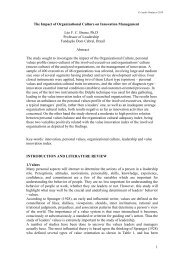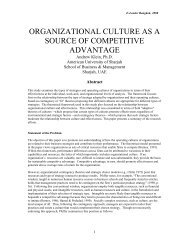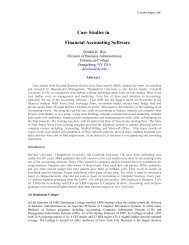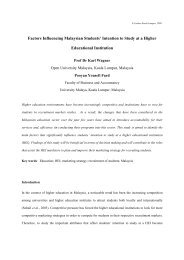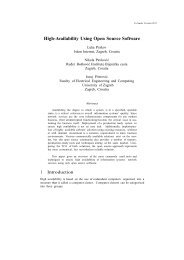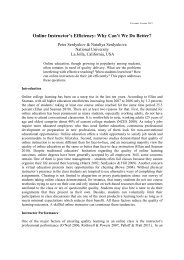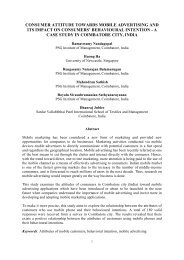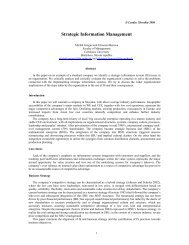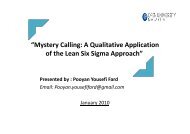Oberholzer [Compatibility Mode].pdf - CASA
Oberholzer [Compatibility Mode].pdf - CASA
Oberholzer [Compatibility Mode].pdf - CASA
You also want an ePaper? Increase the reach of your titles
YUMPU automatically turns print PDFs into web optimized ePapers that Google loves.
PERCEPTIONS OF SOUTH AFRICAN<br />
TAXPAYERS: A COMPARITIVE STUDY<br />
Prof Ruanda <strong>Oberholzer</strong><br />
University of Pretoria
INTRODUCTION<br />
• A government’s success or failure to collect<br />
tax rests upon the honesty of taxpayers<br />
(Adams, 1921:536).<br />
• Tax resistance takes two major forms, tax<br />
avoidance and tax evasion (Lewis, 1982:123;<br />
OECD, 2004; Webley, Robben, Elffers and Hessing,<br />
1991:2).<br />
• There appears to be a substantial tax gap<br />
between the tax that is theoretically<br />
collectable from economically active persons<br />
in South Africa and the tax that is actually<br />
collected.<br />
• A figure of R30 billion has been quoted in the<br />
press (Cokayne, 2002:6; Kemp, 2002; Leuvennink,<br />
2003:1; Mbanga, 2004; Temkin, 2003:1).
• The reasons for evading taxes have been explored<br />
by both economists and psychologists.<br />
• An extensive literature review was conducted and<br />
prior research on various aspects relating to tax<br />
evasion was analysed.<br />
• A customised scale was developed taking<br />
cognisance of this previous research.<br />
• The country of focus for this study was South Africa<br />
as only limited research on taxpayers’ perceptions<br />
has been conducted within a South African context.<br />
• This paper reports specifically on the design of the<br />
questionnaire and whether the findings from the<br />
current research substantiates earlier research.
QUESTIONNAIRE DESIGN<br />
• The questionnaire started with a number of demographic questions<br />
for example age, gender, educational background, employment<br />
status.<br />
• Additional personal information was determined for example<br />
support for current government, views about the future of South<br />
Africa, views on income distribution, risk profile, prior dealings with<br />
SARS.<br />
• Respondents were then asked whether they agreed, disagreed or<br />
had no opinion concerning a number of statements dealing with<br />
general issues related to tax.<br />
• Respondents were also asked whether they agreed, disagreed or<br />
had no opinion regarding a number of statements that relate to tax<br />
evasion (to determine their views on tax evasion).<br />
• Respondents were then asked to answer “yes” or “no” to statements<br />
relating to tax compliance (to determine their actions on tax<br />
evasion).
General tax-related statements<br />
• A large proportion of taxes is used by the government for<br />
meaningless purposes<br />
• It is unfair to pay tax<br />
• Income tax rates and the VAT-rate must be reduced<br />
• The income tax rate (%) should be the same regardless of the<br />
amount of income earned (i.e. everybody pays income tax using the<br />
same percentage irrespective of the amount you earn)<br />
• I do not know why I have to pay tax<br />
• Waste and corruption in government is high<br />
• Rich people should pay tax at a higher rate<br />
• Tax is very complicated - I do not know how to calculate my own tax<br />
liability<br />
• The amount of tax I have to pay is reasonable considering the<br />
benefits received<br />
• The government does not provide enough information about how<br />
they use taxpayers’ money
Statements relating to tax evasion<br />
• The fiscal authorities would notice if I decided to evade tax<br />
• Government receives enough tax so it does not matter if some<br />
people evade tax<br />
• The burden of tax is so heavy that many people are forced to<br />
evade it in order to survive<br />
• Since so many other people are evading tax, I cannot be<br />
blamed for evading tax<br />
• I work hard for the income I receive so I should be allowed to<br />
keep it all for myself<br />
• People evade tax because the risk that the authorities will find<br />
out is low<br />
• Wealthy people evade tax more often than poor people
Statements relating to tax compliance<br />
• Every year I report all of my income to the fiscal authorities<br />
(SARS) when I submit my income tax return<br />
• I would consider not reporting all of my income to the fiscal<br />
authorities (SARS) when I submit my income tax return in future<br />
• I have sometimes made higher deductions than was legally<br />
permitted when I submitted my income tax return<br />
• I would consider making higher deductions than legally<br />
permitted when I submit my income tax return in future<br />
• I would still accept a job if the employer offers not to deduct any<br />
income tax even though, by law, the employer should<br />
• If a tax advisor advises me not to declare all of my income, I<br />
would take his advice
METHODOLOGY<br />
• Research was of an exploratory nature.<br />
• Statistical hypothesis testing wasn’t used.<br />
• Data was collected from a sample of 260 South African<br />
taxpayers by means of face to face interviews, based on the<br />
questionnaire.<br />
• Study focused on natural taxpayers within the Tshwane<br />
metropolitan area (which includes Pretoria, the capital city<br />
of South Africa) in Gauteng.<br />
• A private, independent company (i.e., MarkData) was<br />
contracted to aid in performing the survey.<br />
• The sample was considered to be acceptable when<br />
compared with the 2001 census information (Statistics South<br />
Africa, 2004:19-23).
RESULTS<br />
1. Individual demographic, economic or other factors and<br />
respondents’ attitudes towards general tax related issues<br />
2. Individual demographic, economic or other factors and<br />
respondents’ attitudes towards tax evasion<br />
3. Individual demographic, economic or other factors and<br />
respondents’ attitudes towards tax compliance<br />
4. Relationship between respondents’ perceptions towards<br />
specific tax-related statements and tax evasion<br />
5. Relationship between respondents’ perceptions towards<br />
specific tax-related statements and tax compliance
1. Individual demographic, economic or other<br />
factors and respondents’ attitudes towards<br />
general tax related issues<br />
Statement Factor Past Research Current<br />
Research<br />
Income tax<br />
rates must<br />
be<br />
reduced<br />
And<br />
The VAT<br />
rate must<br />
be<br />
reduced<br />
Age Younger people are more<br />
favourably inclined towards<br />
increased services (thus higher<br />
tax rates). Thus, it appears as if<br />
attitudes and life experience may<br />
have an impact on taxpayers’<br />
actions (Mueller, 1963:233).<br />
No significant<br />
differences were<br />
found.
1. Individual demographic, economic or other<br />
factors and respondents’ attitudes towards<br />
general tax related issues<br />
Statement<br />
Income<br />
tax rates<br />
must be<br />
reduced<br />
And<br />
The VAT<br />
rate must<br />
be<br />
reduced<br />
Factor Past Research Current<br />
Research<br />
Employ Self-employed taxpayers<br />
ment are more likely to agree<br />
status that tax revenue is too high<br />
and that the fiscal<br />
exchange rate is<br />
unfavourable (Vogel,<br />
1974:507).<br />
No significant<br />
differences were<br />
found.
2. Individual demographic, economic or other<br />
factors and respondents’ attitudes towards<br />
tax evasion<br />
Factor Past Research Current<br />
Research<br />
Age Young people are more likely to<br />
be associated with tax evasion<br />
behaviour (Webley et al.,<br />
1991:68-77).<br />
Gender Friedland et al., (1978:113)<br />
found that females evaded tax<br />
more readily than males.<br />
Webley et al., (1991:68-77)<br />
revealed that men evaded tax<br />
more often than women.<br />
Respondents over 60<br />
years of age believe to<br />
a greater extent that<br />
tax evasion is not<br />
acceptable.<br />
No differences were<br />
found in this study.
2. Individual demographic, economic or other<br />
factors and respondents’ attitudes towards<br />
tax evasion<br />
Factor Past Research Current<br />
Research<br />
Educational<br />
back- background<br />
Employ<br />
ment<br />
status<br />
Groenland and Van Veldhoven<br />
(1983, in Webley et al.,<br />
1991:59) found that people with<br />
a higher level of education<br />
evaded tax more than those<br />
with a lower education.<br />
Webley et al., (1991:68-77)<br />
found that people who are<br />
employed are most likely to be<br />
associated with tax evasion<br />
behaviour.<br />
It was found that<br />
respondents with a<br />
higher educational<br />
qualification may tend<br />
to evade less than the<br />
respondents that have<br />
not completed school.<br />
No differences were<br />
found.
2. Individual demographic, economic or other factors and<br />
respondents’ attitudes towards tax evasion<br />
Factor Past Research Current<br />
Research<br />
Risk<br />
profile<br />
Level of<br />
support<br />
for<br />
current<br />
government<br />
Dean et al., (1980:42) noted that<br />
the desire to “beat the system”<br />
is a possible reason for tax<br />
evasion.<br />
In Lewis’s (1982:172) model of<br />
tax evasion, in relation to<br />
individuals, fiscal attitudes and<br />
perceptions (which include the<br />
individual’s support for<br />
government policies) affect a<br />
taxpayer’s decision whether or<br />
not to evade paying tax.<br />
This study shows no<br />
differences in<br />
perceptions between<br />
respondents with<br />
different risk profiles.<br />
No differences were<br />
revealed.
2. Individual demographic, economic or other<br />
factors and respondents’ attitudes towards<br />
tax evasion<br />
Factor Past Research Current<br />
Research<br />
Views on<br />
the<br />
future of<br />
South<br />
Africa<br />
According to Lewis’s (1982:172)<br />
model of tax evasion, some<br />
taxpayers may have a better<br />
understanding of the working of<br />
fiscal policy than others, and, by<br />
contrast, tax authorities who are<br />
perceived as rigorous invaders of<br />
personal liberty may, in turn,<br />
engender more antipathetic tax<br />
attitudes.<br />
No differences were<br />
revealed.
2. Individual demographic, economic or other<br />
factors and respondents’ attitudes towards<br />
tax evasion<br />
Factor Past Research Current<br />
Research<br />
Views<br />
on<br />
income<br />
distributi<br />
on<br />
According to the Australian<br />
Cash Economy Task Force<br />
(1998:18), taxpayer compliance<br />
decisions can be affected by<br />
economic factors such as the<br />
tax system.<br />
Respondents who are<br />
of the opinion that<br />
everyone should be<br />
entitled to keep the<br />
income they earn,<br />
would evade tax more<br />
than those who believe<br />
that all income earned<br />
should accrue to the<br />
government, which<br />
should distribute this<br />
equally among all<br />
South Africans.
3. Individual demographic, economic or other<br />
factors and respondents’ attitudes towards<br />
tax compliance<br />
Factor Past Research Current<br />
Research<br />
Age People who are young are most<br />
likely to be associated with tax<br />
evasion behaviour (Webley et<br />
al., 1991:68-77).<br />
This study indicates<br />
that respondents over<br />
60 years of age are<br />
more likely to be tax<br />
compliant, whereas<br />
younger respondents<br />
(that is, 21-29 years of<br />
age) are less likely to<br />
be tax compliant.
3. Individual demographic, economic or other<br />
factors and respondents’ attitudes towards<br />
tax compliance<br />
Factor Past Research Current<br />
Research<br />
Risk<br />
profile<br />
The desire to “beat the system” It appears that<br />
is a possible cause of tax respondents who<br />
evasion (Dean et al., 1980:42). consider themselves to<br />
be risk-takers are less<br />
likely to be tax<br />
compliant than those<br />
who consider<br />
themselves to be more<br />
risk averse.
3. Individual demographic, economic or other<br />
factors and respondents’ attitudes towards<br />
tax compliance<br />
Factor Past Research Current<br />
Research<br />
Prior<br />
dealings<br />
with<br />
SARS<br />
Lewis (1982:172) suggests that<br />
tax inspectors influence a<br />
person’s attitude to tax<br />
behaviour.<br />
Respondents who have<br />
consulted with SARS<br />
officials in the past are<br />
more likely to comply<br />
with tax requirements<br />
than those who have<br />
not.
3. Individual demographic, economic or other<br />
factors and respondents’ attitudes towards<br />
tax compliance<br />
Factor Past Research Current<br />
Research<br />
Views<br />
on<br />
income<br />
distribution<br />
According to the Australian<br />
Cash Economy Task Force<br />
(1998:18), taxpayer compliance<br />
decisions can be affected by<br />
economic factors such as the<br />
tax system.<br />
Respondents who are<br />
of the opinion that<br />
everyone should be<br />
entitled to keep the<br />
income they earn, are<br />
less tax compliant than<br />
those who believe that<br />
all income earned<br />
should accrue to the<br />
government, which<br />
should distribute this<br />
equally among all<br />
South Africans.
Statement<br />
A large<br />
proportion<br />
of taxes is<br />
used by<br />
the<br />
government<br />
for<br />
meaningle<br />
ss<br />
purposes<br />
4. Relationship between respondents’<br />
perceptions towards specific tax-related<br />
statements and tax evasion<br />
Past Research Current<br />
Research<br />
A possible reason for tax<br />
evasion is government<br />
wastage (Dean et al.,<br />
1980:42).<br />
The majority of all the<br />
respondents agreed with the<br />
statement: “A large proportion<br />
of taxes is used by the<br />
government for meaningless<br />
purposes”. Similarly, the<br />
majority of respondents who<br />
agreed with the statements<br />
relating to tax evasion (that is,<br />
those who will tend to evade<br />
more), also agree with this<br />
statement.
Statement<br />
4. Relationship between respondents’<br />
perceptions towards specific tax-related<br />
statements and tax evasion<br />
Past Research Current<br />
Research<br />
It is Previous research revealed<br />
unfair to that people use the<br />
pay tax unfairness of the tax system<br />
as a justification for evasion<br />
(Webley et al., 1991:68-77).<br />
The current study showed no<br />
relationship.
Statement<br />
Income<br />
tax rates<br />
must be<br />
reduced<br />
and the<br />
VAT rate<br />
must be<br />
reduced<br />
4. Relationship between respondents’<br />
perceptions towards specific tax-related<br />
statements and tax evasion<br />
Past Research Current<br />
Research<br />
A substantial proportion of<br />
South African respondents<br />
indicated that they would<br />
support the introduction of<br />
lower tax rates (<strong>Oberholzer</strong>,<br />
2005:249-275).<br />
The current study showed no<br />
relationship.
Statement<br />
Tax is<br />
very<br />
complica<br />
ted – I<br />
do not<br />
know<br />
how to<br />
calculate<br />
my own<br />
tax<br />
liability<br />
4. Relationship between respondents’<br />
perceptions towards specific tax-related<br />
statements and tax evasion<br />
Past Research Current<br />
Research<br />
Song and Yarbrough<br />
(1978:450) asked<br />
respondents to compare<br />
and rank each of the five<br />
commonly discussed<br />
shortcomings of income tax.<br />
They found that “there are<br />
too many loopholes” and<br />
“the regulations are too<br />
complicated” were ranked<br />
second and third<br />
respectively.<br />
A high proportion of all<br />
respondents who agree with<br />
the statements relating to tax<br />
evasion (that is, those who<br />
will tend to evade more),<br />
agree that tax is complicated<br />
and that they do not know<br />
how to calculate their own tax<br />
liability.
Statement Past Research Current<br />
Research<br />
The<br />
amount of<br />
tax I have<br />
to pay is<br />
reasonable<br />
considering<br />
the benefits<br />
received<br />
4. Relationship between respondents’<br />
perceptions towards specific tax-related<br />
statements and tax evasion<br />
A past study found that<br />
on the whole, South<br />
African respondents are<br />
positive about paying tax,<br />
if the government applies<br />
the revenue appropriately<br />
for the benefit of the<br />
taxpayer (<strong>Oberholzer</strong>,<br />
2005:249-275).<br />
A large proportion of the<br />
respondents who agree with<br />
the statements relating to tax<br />
evasion (that is, those who<br />
will tend to evade more),<br />
disagree with the statement:<br />
“The amount of tax I have to<br />
pay is reasonable considering<br />
the benefits received”.
Statement Past Research Current<br />
Research<br />
The<br />
government<br />
does not<br />
provide<br />
enough<br />
information<br />
about how<br />
they use<br />
taxpayers’<br />
money<br />
4. Relationship between respondents’<br />
perceptions towards specific tax-related<br />
statements and tax evasion<br />
A study conducted by<br />
<strong>Oberholzer</strong> (2005:249-<br />
275) showed that a<br />
significant proportion of the<br />
South African respondents<br />
are of the opinion that the<br />
government should be<br />
more transparent in the<br />
utilisation of taxpayers’<br />
money.<br />
The majority of all respondents<br />
agreed with this statement.<br />
Similarly, a large proportion of<br />
respondents who agree with<br />
the statements relating to tax<br />
evasion (that is, those who will<br />
tend to evade more), agree that<br />
the government does not<br />
provide enough information<br />
about how they use taxpayers’<br />
money.
Statement Past Research Current<br />
Research<br />
A large<br />
proportion of<br />
taxes is used<br />
by the<br />
government<br />
for<br />
meaningless<br />
purposes<br />
5. Relationship between respondents’<br />
perceptions towards specific tax-related<br />
statements and tax compliance<br />
A possible reason for<br />
tax evasion is<br />
government wastage<br />
(Dean et al., 1980:42).<br />
The majority of all the<br />
respondents agreed with this<br />
statement. Similarly, a large<br />
proportion of the respondents<br />
who are less tax compliant,<br />
agree with this statement.
Statement<br />
5. Relationship between respondents’<br />
perceptions towards specific tax-related<br />
statements and tax compliance<br />
Past Research Current<br />
Research<br />
It is Previous research revealed<br />
unfair to that people use the<br />
pay tax unfairness of the tax system<br />
as a justification for evasion<br />
(Webley et al., 1991:68-77).<br />
The majority of all the<br />
respondents disagreed with<br />
this statement. Nevertheless,<br />
a greater proportion of the<br />
respondents who are more<br />
tax compliant, disagree with<br />
the abovementioned<br />
statement than those who are<br />
less compliant.
Statement<br />
Income<br />
tax rates<br />
and the<br />
VAT rate<br />
must be<br />
reduced<br />
5. Relationship between respondents’<br />
perceptions towards specific tax-related<br />
statements and tax compliance<br />
Past Research Current<br />
Research<br />
A substantial proportion of<br />
South African respondents<br />
indicated that they would<br />
support the introduction of<br />
lower tax rates (<strong>Oberholzer</strong>,<br />
2005:249-275).<br />
The majority of all the<br />
respondents agreed with<br />
these statements. Similarly, a<br />
large proportion of the<br />
respondents who are less tax<br />
compliant, agree that the<br />
rates must be reduced.
Statement<br />
Tax is<br />
very<br />
compli- complicated<br />
– I<br />
do not<br />
know<br />
how to<br />
calculate<br />
my own<br />
tax<br />
liability<br />
5. Relationship between respondents’<br />
perceptions towards specific tax-related<br />
statements and tax compliance<br />
Past Research Current<br />
Research<br />
Song and Yarbrough<br />
(1978:450) asked<br />
respondents to compare<br />
and rank each of the five<br />
commonly discussed<br />
shortcomings of income<br />
tax. They found that “there<br />
are too many loopholes”<br />
and “the regulations are<br />
too complicated” were<br />
ranked second and third<br />
respectively.<br />
The findings of this study<br />
reveal that amongst those<br />
respondents that are more tax<br />
compliant, there is an even<br />
division between those who<br />
agree, those who disagree and<br />
those with neutral views<br />
towards this statement.
Statement Past Research Current<br />
Research<br />
The<br />
amount of<br />
tax I have<br />
to pay is<br />
reasonable<br />
considering<br />
the benefits<br />
received<br />
5. Relationship between respondents’<br />
perceptions towards specific tax-related<br />
statements and tax compliance<br />
A past study found that<br />
on the whole, South<br />
African respondents are<br />
positive about paying tax,<br />
if the government applies<br />
the revenue appropriately<br />
for the benefit of the<br />
taxpayer (<strong>Oberholzer</strong>,<br />
2005:249-275).<br />
A higher proportion of the<br />
respondents who are less tax<br />
compliant disagree with the<br />
statement, compared to those<br />
who are more tax compliant.
Statement Past Research Current<br />
Research<br />
The<br />
government<br />
does not<br />
provide<br />
enough<br />
information<br />
about how<br />
they use<br />
taxpayers’<br />
money<br />
5. Relationship between respondents’<br />
perceptions towards specific tax-related<br />
statements and tax compliance<br />
A study conducted by<br />
<strong>Oberholzer</strong> (2005:249-<br />
275) showed that a<br />
significant proportion of<br />
the South African<br />
respondents are of the<br />
opinion that the<br />
government should be<br />
more transparent in the<br />
utilisation of taxpayers’<br />
money.<br />
The majority of all the<br />
respondents agreed that the<br />
government does not provide<br />
enough information about<br />
how they use taxpayers’<br />
money, however, a higher<br />
proportion of respondents<br />
who are less compliant, agree<br />
with the statement.
6. Perceptions of penalties relating to tax evasion<br />
Statement Past Research Current<br />
Research<br />
The<br />
appropriateness<br />
of<br />
penalties<br />
with regard<br />
to tax<br />
evasion<br />
In a Swedish study, Vogel<br />
(1974:499-513)<br />
requested taxpayers to<br />
choose suitable penalties<br />
for tax evasion from a set<br />
of fixed alternatives. The<br />
choice of a prison term<br />
appears to be a good<br />
indicator of the perceived<br />
seriousness of tax<br />
offences.<br />
In South Africa the<br />
respondents have stronger<br />
views regarding the<br />
punishment for crimes such<br />
as hijacking, housebreaking<br />
and drunken driving<br />
(imprisonment) than<br />
punishment for tax-related<br />
offences (fine). The<br />
respondents do not perceive<br />
tax evasion and failing to<br />
report additional income to be<br />
as serious as the<br />
aforementioned crimes.
6. Perceptions of penalties relating to tax evasion<br />
Statement Past Research Current<br />
Research<br />
The severity<br />
of penalties<br />
will affect<br />
evasion.<br />
The risk that<br />
the<br />
authorities<br />
will find out.<br />
According to Allingham<br />
and Sandmo’s<br />
(1972:338) classical<br />
model if penalties are<br />
severe, people will be<br />
more compliant.<br />
The findings of this study<br />
contradict the classical model.<br />
A large proportion of the<br />
respondents who agree with<br />
the statements relating to tax<br />
more compliant. evasion (that is, those who<br />
A study by Dean et al.<br />
(1980:39-40) found that<br />
tax evasion may increase<br />
if people believe that they<br />
will not be detected.<br />
will tend to evade more) also<br />
believe that the penalties<br />
associated with tax evasion<br />
are too severe.<br />
The results of the present<br />
study reveal that tax evasion<br />
may increase if people<br />
believe that they will not be<br />
detected.
CONCLUSION<br />
• It is imperative to determine<br />
taxpayers’ perceptions. This will<br />
influence government policy<br />
regarding to taxation.<br />
• In addition it will enable<br />
government to market itself and<br />
its services more effectively to the<br />
general public.<br />
• The results of this study suggest<br />
that a large number of factors play<br />
a role in individual behaviour.
• In addition to include factors from previous research the<br />
study also included factors unique to South Africa.<br />
• This study expanded on previous research by adding<br />
factors unique to South Africa, these factors include<br />
population groups, home language, income per month,<br />
registered as a taxpayer.<br />
• The study only focused on natural persons. Other persons<br />
might extend the findings of this research by testing these<br />
findings in other areas, amongst other population groups<br />
and utilising other interrogation methods.<br />
• Thank you!!!


![Oberholzer [Compatibility Mode].pdf - CASA](https://img.yumpu.com/21081507/1/500x640/oberholzer-compatibility-modepdf-casa.jpg)
